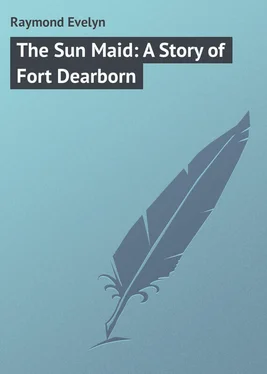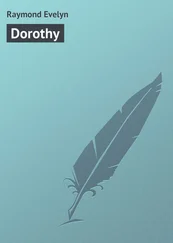Evelyn Raymond - The Sun Maid - A Story of Fort Dearborn
Здесь есть возможность читать онлайн «Evelyn Raymond - The Sun Maid - A Story of Fort Dearborn» — ознакомительный отрывок электронной книги совершенно бесплатно, а после прочтения отрывка купить полную версию. В некоторых случаях можно слушать аудио, скачать через торрент в формате fb2 и присутствует краткое содержание. Жанр: foreign_prose, на английском языке. Описание произведения, (предисловие) а так же отзывы посетителей доступны на портале библиотеки ЛибКат.
- Название:The Sun Maid: A Story of Fort Dearborn
- Автор:
- Жанр:
- Год:неизвестен
- ISBN:нет данных
- Рейтинг книги:5 / 5. Голосов: 1
-
Избранное:Добавить в избранное
- Отзывы:
-
Ваша оценка:
- 100
- 1
- 2
- 3
- 4
- 5
The Sun Maid: A Story of Fort Dearborn: краткое содержание, описание и аннотация
Предлагаем к чтению аннотацию, описание, краткое содержание или предисловие (зависит от того, что написал сам автор книги «The Sun Maid: A Story of Fort Dearborn»). Если вы не нашли необходимую информацию о книге — напишите в комментариях, мы постараемся отыскать её.
The Sun Maid: A Story of Fort Dearborn — читать онлайн ознакомительный отрывок
Ниже представлен текст книги, разбитый по страницам. Система сохранения места последней прочитанной страницы, позволяет с удобством читать онлайн бесплатно книгу «The Sun Maid: A Story of Fort Dearborn», без необходимости каждый раз заново искать на чём Вы остановились. Поставьте закладку, и сможете в любой момент перейти на страницу, на которой закончили чтение.
Интервал:
Закладка:
Sultry as the night was, there was yet a great council fire blazing in the midst of the settlement, and around this were grouped many young braves of the tribe. Before the arrival of their chief there had been a babel of tongues in the council, but all discussion ceased as he joined the circle in the firelight.
The sudden silence was ominous, and the wise leader understood it; but it was not his purpose then to quarrel with any man. Ignoring the scowling glances bestowed upon him, he gave the customary evening salutation and, advancing directly to the fire, plucked a blazing fagot from it. This he lifted high and purposely held so that its brightness illuminated the face and figure of the child upon his breast.
A guttural exclamation of astonishment ran from brave to brave. The action of their chief was significant, but its meaning not clearly comprehended. Had he brought the white baby as a hostage from the distant garrison, in pledge that the compact of its commandant would surely be kept? Or had some other tribe anticipated their own in obtaining the gifts to be distributed?
Shut-Hand, one of the older warriors, whose name suggested his character, rose swiftly to his feet, and demanded menacingly:
“What means our father, thus bringing hither the white papoose?”
“That which the Black Partridge does – he does.”
Rebuked, but unsatisfied, the miserly inquirer sat down. Then, with a gesture of protection, the chief raised the sleeping little one, that all within the circle might better see her wonderful, glowing beauty, intensified as it was by the flare of the flames as well as by contrast to the dusky faces round about.
“Who suffers harm to her shall himself suffer. She is the Sun Maid, the new daughter of our tribe.”
Having said this, and still carrying the burning fagot, he walked to the closed tepee of his widowed sister and lifted its door flap. Stooping his tall head till its feathered crest swept the floor he entered the spacious lodge. But he sniffed with contempt at the stifling atmosphere within, and laying down his torch raised the other half of the entrance curtain.
At the back of the wigwam, crouching in the attitude she had sustained almost constantly since her bereavement, sat the Woman-Who-Mourns. She did not lift her head, or give any sign of welcome till the chief had crossed to her side, and in a tone of command bade her:
“Arise and listen, my sister, for I bring you joy.”
“There is no joy,” answered the woman, obediently lifting her tall figure to a rigidly erect posture; by long habit compelled to outward respect, though her heart remained indifferent.
“Put back the hair from your eyes. Behold. For the dead son I give you the living daughter. In that land to which both have gone will her lost mother care for your lost child as you now care for her.”
Slowly, a pair of lean, brown hands came out from the swathing blanket and parted the long locks that served as a veil to hide a haggard, sorrowful face. After the deep gloom the sudden firelight dazzled the woman’s sight, and she blinked curiously toward the burden upon her brother’s breast. Then the small eyes began to see more clearly and to evince the amazement that filled her.
“Dreams have been with me. They were many and strange. Is this another?”
“This a glad reality. It is the Sun Maid. She has no parents. You have no child. She is yours. Take her and learn to laugh once more as in the days that are gone.”
Then he held the little creature toward her; and still amazed, but still obedient, the heart-broken squaw extended her arms and received the unconscious foundling. As the warm, soft flesh touched her own a thrill passed through her desolate heart, and all the tenderness of motherhood returned.
“Who is she? Whence did she come? Where will she go?”
“She is the Sun Maid. From the Fort by the great lake, where are still white men enough to die – as die they must. For there is treachery afoot, and they who were first treacherous must bear their own punishment. Only she shall be saved; and where she will go is in the power of the Woman-Who-Mourns, and of her alone.”
Without another word, and leaving the still blazing fagot lying on the earthen floor, the chief went swiftly away.
But he had brought fresh air and light and comfort with him, as he had prophesied. The small Sun Maid was already brightening the dusky lodge as might an actual ray from her glorious namesake.
It was proof of her utter exhaustion that she still slept soundly while her new foster-mother prepared a bed of softest furs spread over fresh green branches and went hurriedly out to beg from a neighbor squaw a draught of evening’s milk. This action in itself was sufficiently surprising to set all tongues a-chatter.
The lodge of Muck-otey-pokee had many of the comforts common to the white men’s settlements. Its herd of cattle even surpassed that at Fort Dearborn itself, and was a matter of no small pride to the Pottawatomie villagers. From the old mission fathers they had learned, also, some useful arts, and wherever their prairie lands were tilled a rich result was always obtainable.
So it was to a home of plenty, as well as safety, that Black Partridge had brought the little Sun Maid; and when she at length awoke to see a dusky face, full of wonderment and love, bending above her, she put out her arms and gurgled in a glee which brought an answering smile to lips that had not smiled for long.
With an instinct of yearning tenderness, the Woman-Who-Mourns had lightened her sombre attire by all the devices possible, so that while the child slept she had transformed herself. She had neatly plaited her heavy hair, and wound about her head some strings of gay beads. She had fastened a scarlet tanager’s wing to her breast, now covered by a bright-hued cotton gown once sent her from the Fort, and for which she had discarded her dingy blanket. But the greatest alteration of all was in the face itself, where a dawning happiness brought out afresh all the good points of a former comeliness.
“Oh! Pretty! I have so many, many nice mammas. Are you another?”
“Yes. All your mother now. My Sun Maid. My Girl-Child. My papoose!”
“That is nice. But I’m hungry. Give me my breakfast, Other Mother. Then I will go seek my bunny rabbit, that runned away, and my yellow posies that went to sleep when I did. Did you put them to bed, too, Other Mother?”
“There are many which shall wake for you, papoose,” answered the woman, promptly; for though she did not understand about the missing blossoms, it was fortunate that she did both understand and speak the language of her adopted daughter. Her dead husband had been the tribe’s interpreter, and both from him and from the Fort’s chaplain she had acquired considerable knowledge.
Until her widowhood and voluntary seclusion the Woman-Who-Mourns had been a person of note at Muck-otey-pokee; and now by her guardianship of this stranger white child she bade fair to again become such.
CHAPTER II.
TWO FOR BREAKFAST
The dead son of the Woman-Who-Mourns had never been disobedient, and small Kitty Briscoe had never obeyed anybody. She had laughed and frolicked her way through all rules and over all obstacles with a merry indifference that would have been insolent had it been less innocent and charming. During her short life the orphan had heard no voice but was full of tenderness, toward her at least; and every babyish misdemeanor had been pardoned almost before it was committed, by reason of her exceeding loveliness and overflowing affection. She had so loved all that she feared none, and not one of the kind mothers at the Fort had felt it her especial duty to discipline so sweet and fearless a nature. By and by, when she grew older, why, of course, the child must come under the yoke, like other children of that stern generation; but for the present, what was she but an ignorant baby, a motherless babe at that?
Читать дальшеИнтервал:
Закладка:
Похожие книги на «The Sun Maid: A Story of Fort Dearborn»
Представляем Вашему вниманию похожие книги на «The Sun Maid: A Story of Fort Dearborn» списком для выбора. Мы отобрали схожую по названию и смыслу литературу в надежде предоставить читателям больше вариантов отыскать новые, интересные, ещё непрочитанные произведения.
Обсуждение, отзывы о книге «The Sun Maid: A Story of Fort Dearborn» и просто собственные мнения читателей. Оставьте ваши комментарии, напишите, что Вы думаете о произведении, его смысле или главных героях. Укажите что конкретно понравилось, а что нет, и почему Вы так считаете.












